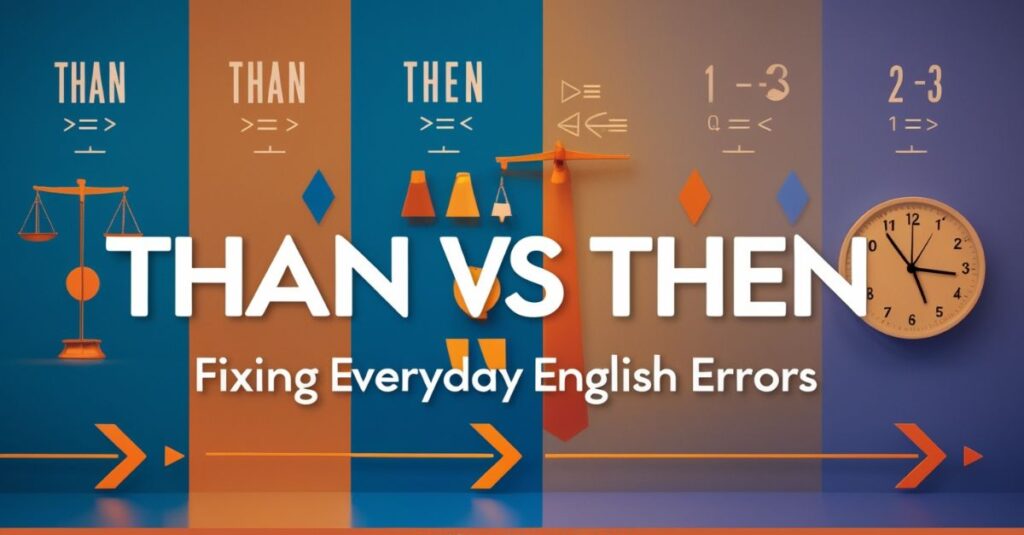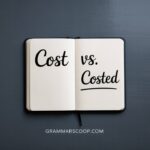Than vs Then is one of those pairs of words that look and sound similar but mean entirely different things. Misusing them is a classic English grammar slip-up, and it can instantly make your writing look careless.
Whether you’re writing an email to your boss, crafting a social media post, or studying for an exam, understanding the difference between than and then is critical. In this guide, you’ll learn the grammar rules, practical examples, historical roots, and common mistake fixes so you can use each word with confidence.
Quick Summary
The easiest way to remember the difference between than and then is this: than is for comparisons, and then is for time, sequence, or results. If you’re showing how one thing differs from another, choose than (“She is taller than him”). If you’re talking about when something happened, what happens next, or the consequence of an action, use then (“We had lunch, then went shopping”). Always proofread for context, because both words are spelled correctly and won’t be caught by spellcheck meaning the only way to avoid this common mistake is to read carefully and think about the sentence’s meaning.
Why Do People Confuse Than vs Then?
Mixing up then vs. than is a classic slip-up, and it’s not just beginners who do it. Even fluent English speakers fall into this trap for a few simple reasons.
Similar Pronunciation but Different Functions
Both words have a short vowel sound and can sound almost identical in fast or casual speech.
- Than used for comparisons (smaller than, faster than).
- Then used for time, order, or consequences (first this, then that).
Because our ears hear them similarly, our fingers sometimes type the wrong one.
Influence of Autocorrect and Speech-to-Text Errors
Modern typing tools often “guess” your word based on patterns. Since then is more common in general writing, autocorrect may replace than without you noticing. Similarly, voice to text apps can misinterpret pronunciation, turning a correct than into a wrong then (or vice versa).
Regional Dialects and Informal Writing Habits
In some dialects, the vowel difference is so subtle it almost disappears, making the two words indistinguishable in conversation. Combine that with casual texting or social media habits where grammar often takes a back seat and the wrong form slips into everyday writing without much thought.
Think of it this way: They may look like twins, but they have completely different jobs in a sentence.
More Important Than or Then
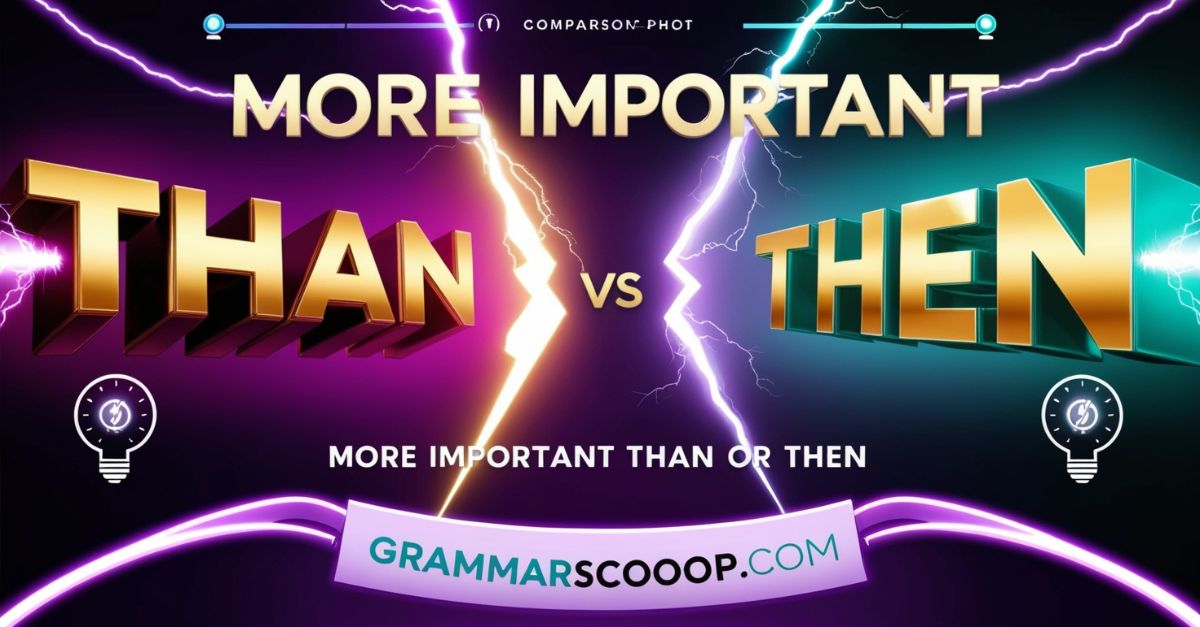
The correct phrase is “more important than” when comparing two things. For example, “Health is more important than wealth.” Here, than introduces the second item in the comparison. Using “more important then” would change the meaning, implying a sequence like something became more important afterward which is rare and context-specific. For instance, “We discussed safety first, and more important then was the budget,” which sounds awkward in most situations. To avoid mistakes, remember: than equals comparison, then equals time or order.
The Meaning and Function of Than
In most cases, than is a conjunction or preposition used for comparisons.
Definition
- Than shows contrast or difference between two things.
Primary Uses
- Comparison in adjectives
- She’s taller than her brother.
- This test is harder than the last one.
- Comparison in adverbs
- He runs faster than I do.
- They arrived earlier than expected.
- Comparison in nouns
- I have more books than space to store them.
- As a preposition (less common in modern English)
- No sooner had we started than it began to rain.
When to Use Than
- Use than whenever you’re measuring, comparing, or contrasting things.
The Meaning and Function of Then
Then is more flexible it can be an adverb, adjective, or noun, but its meaning always relates to time, sequence, or consequence.
Definition
- Refers to a moment in time, a step in a sequence, or a result of something.
Primary Uses
- Time sequence
- First we ate, then we went to the park.
- I was living in New York back then.
- Consequence/result
- If you study hard, then you’ll pass.
- The road was blocked; then we took another route.
- Conditional phrases
- Then again, maybe I’m wrong.
- If that’s true, then we have a problem.
When to Use Then
- Use then for time references, logical steps, and cause-effect connections.
Key Differences Between “Than Vs Then”
Here’s a quick-reference table to keep them straight:
| Feature | Than | Then |
|---|---|---|
| Part of Speech | Conjunction / Preposition | Adverb / Noun / Adjective |
| Main Purpose | Comparison | Time, sequence, consequence |
| Example | She is faster than I am. | We finished lunch, then took a nap. |
| Common Pairings | more than, less than, rather than | back then, if…then, and then |
Common Mistakes and How to Fix Them
Even experienced writers mix up than vs then, especially when typing quickly or relying on autocorrect. Here are the most frequent errors and simple ways to avoid them.
Better then instead of better than in comparisons
- Wrong: She is better then her sister at chess.
- Correct: She is better than her sister at chess.
Why: When you’re comparing two people, abilities, or qualities, you need than, not then.
Other then when other than is intended
- Wrong: I don’t watch any shows other then documentaries.
- Correct: I don’t watch any shows other than documentaries.
Why: Other than means “except” or “apart from,” and then doesn’t fit that meaning.
Rather Than vs Rather Then
- Rather Than – Expresses preference between two options.
Example: “I’d rather read than watch TV.” - Rather Then – Indicates a conditional or sequential meaning, but it’s uncommon.
Example: “Rather then agree to his terms, she walked away.”
Overusing “then” as filler in writing
Some writers chain sentences with then far too often:
- Example: I went to the store, then I bought milk, then I walked home.
Fix: Vary transitions—try “after that,” “next,” or rework sentences for smoother flow.
How to Catch Errors with a Quick Read-Aloud Test
Read your sentence out loud and ask:
- Am I comparing? → Use than.
- Am I talking about time, order, or results? → Use then.
Quick Fix Tip:
When proofreading, ask yourself: Am I comparing? → use than.
Am I talking about time or order? → use then.
Tricky Phrases That Cause Confusion
Some phrases seem similar but have distinct meanings.
Other Than vs Other Then
- Other Than: Means “except” or “apart from.”
- I don’t know anyone here other than you.
- Other Then: Rare—only correct if referring to a specific time.
- We had a different plan back in that other then.
More Than vs More Then
- More Than: Quantity comparison.
- She has more than 100 books.
- More Then: Sequence meaning “in addition to that.”
- We saw the Eiffel Tower, more then we visited the Louvre.
Rather Than vs Rather Then
- Rather Than: Preference.
- I’d walk rather than take the bus.
- Rather Then: Rare; means “instead, at that time.”
- We acted cautiously rather then rushing in.
Etymology: How the Words Evolved
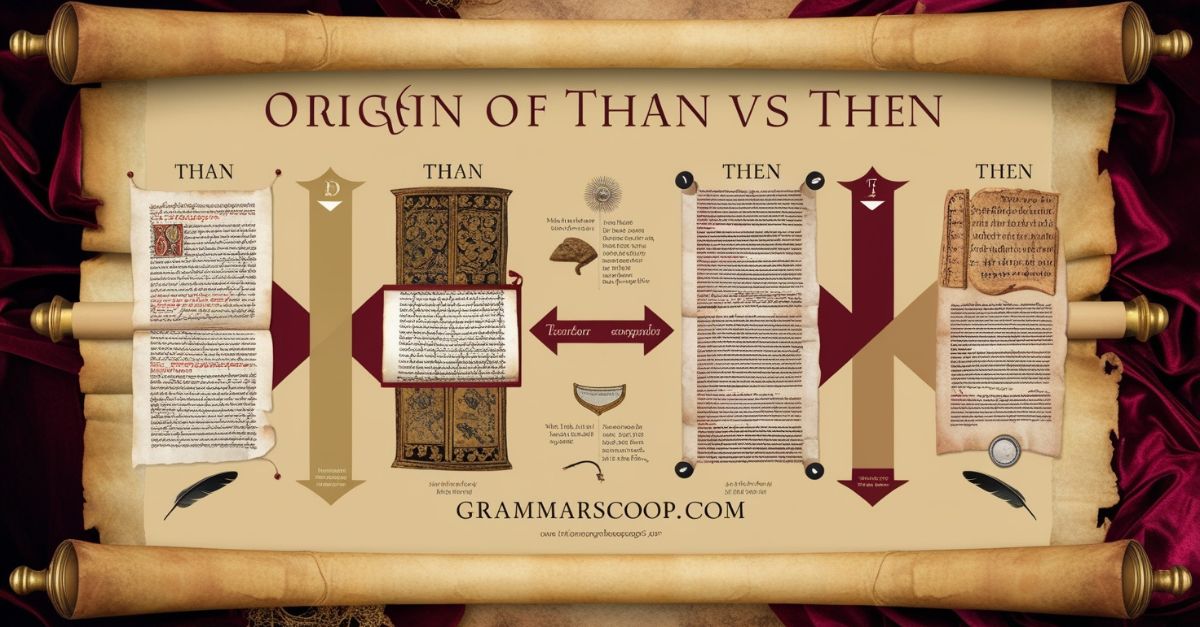
Understanding the history of then vs. than not only satisfies curiosity but also makes their meanings easier to remember. These words have deep roots in the Old English language and have evolved significantly over centuries.
Explore further:
- Sense Vs Since: A Clear Guide to Choosing the Right Word
- Re-sign Vs Resign? Understand the Proper Usage of Each
- Cancelation or Cancellation: Which Spelling is Correct?
- Busses Or Buses: What’s the Proper Plural of Bus?
Origin of Than
The word than traces back to Old English forms “þonne” or “þan”, which were used primarily as comparative adverbs. In those early forms, they indicated difference or contrast—much like today.
Over time, the word shifted from being a flexible adverb to serving almost exclusively as a conjunction and sometimes as a preposition. By the Middle English period (roughly 12th–15th centuries), than had largely taken on its modern role as the go-to word for comparisons:
- “He is swifter than the wind” could have been written in similar form even hundreds of years ago.
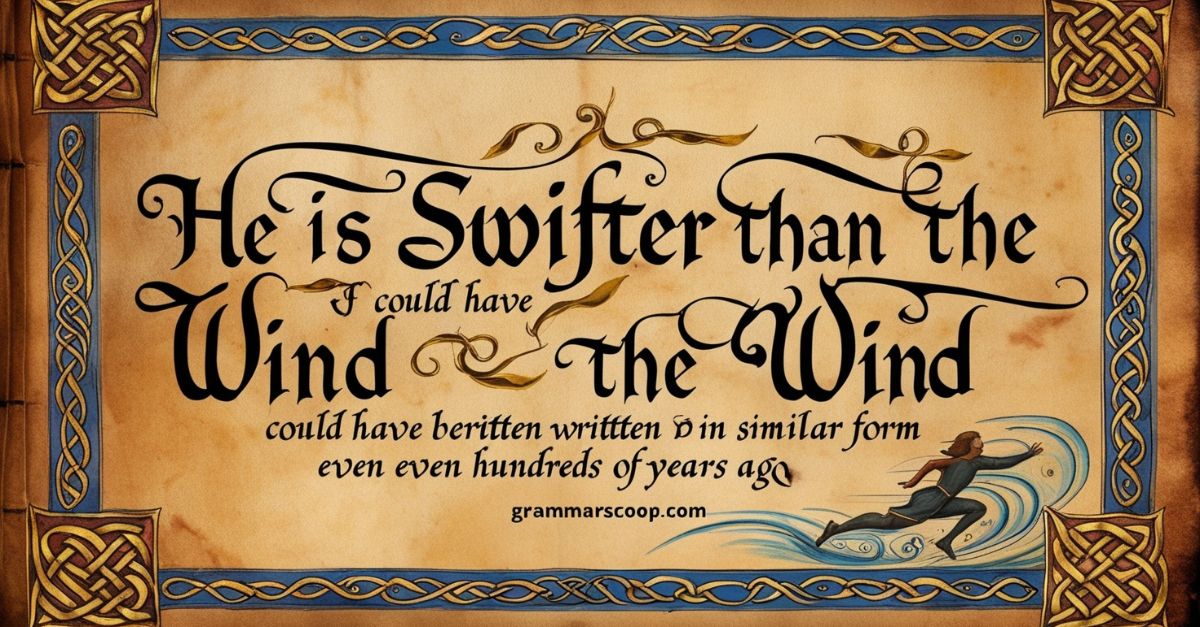
Origin of Then
The word then comes from Old English “þænne”, meaning “at that time.” It carried a strong temporal sense, marking moments in time or points in a sequence.
As English developed, then expanded its function beyond simply marking time. It began to signal logical results (“If this, then that”) and even serve as a conversational transition (“OK, then…”).
By the early modern English period, then had become a highly versatile word, able to operate as:
- An adverb (“I was living there back then”)
- A noun (“We’ll meet at six; until then, take care”)
- An adjective (“The then president announced new policies”)
Quick Memory Tricks
- A for “comparison” in Than Think “compArison has an A like than.”
- E for “time” in Then Think “EvEnts happen in time.”
- Visual cue: “Than” is about height, size, speed measurable things. “Then” is about clocks, calendars, and steps.
Case Study: Business Writing Impact
A marketing agency once sent a client email reading:
“We have more then 10 years of experience.”
The client questioned credibility thinking the agency couldn’t proofread. One missing letter (“than”) cost them a contract.
Lesson: In professional writing, grammar mistakes like these can cost real money.
Practical Exercises
Try replacing the blank with than or then:
- She’s taller ___ I expected.
- We’ll have dinner, ___ watch a movie.
- I’d rather call you ___ send an email.
- Back ___, we didn’t have smartphones.
(Answers: 1. than, 2. then, 3. than, 4. then)
Conclusion
The main takeaway is straightforward: than is used for comparisons, while then relates to time, sequence, or consequences. They may look similar, but their functions couldn’t be more different.
When in doubt, ask yourself one simple question: Am I comparing two things? If yes, use than. If you’re describing an event in time or the next step in a process, then is your word.
Proofreading tip: Don’t just rely on spellcheck both words are spelled correctly, so software won’t flag them. Read your sentence in context and check if it truly conveys the meaning you intend. Catching this small detail will make your writing sharper, clearer, and more professional.
FAQs About Than vs. Then
- How do you use “then” and “than” in a sentence?
She runs faster than I do.” vs “We finished lunch, then took a walk.”
- Do you say “OK then” or “OK than”?
“OK then” is correct—it refers to sequence or agreement.
- Is it “better then” or “better than”?
“Better than” is correct for comparisons.
- What’s an example of “other than” or “other then”?
“I have no hobbies other than reading” is correct in most cases. - when to use than or then?
Use than for comparisons and then for time or sequence.

Lisa Morris is a seasoned blogger and language enthusiast with a passion for making grammar simple and engaging. At Grammar Scoop, she shares clear, concise tips that help readers master the rules of English with confidence.

